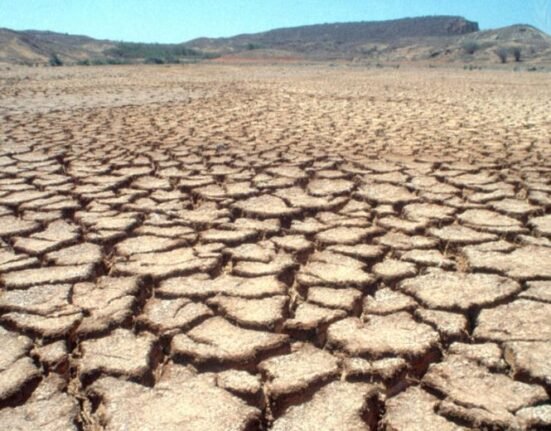HQ Team
December 5, 2023: Greenhouse gases have “turbocharged” drastic glacier loss and sea-level rise during the past decade and climate shocks are undermining sustainable development, with a dire impact on global food security, displacement, and migration, according to a WMO report.
The World Meteorological Organization’s The Global Climate 2011-2020: A Decade of Acceleration report sounds the alarm at the “particularly profound transformation” taking place in the polar regions and high mountains.
“Each decade since the 1990s has been warmer than the one before it, and we see no immediate sign of this trend reversing,” said WMO Secretary-General Petteri Taalas. “We are losing the race to save our melting glaciers and ice sheets.”
“We have to cut greenhouse gas emissions as a top and overriding priority for the planet to prevent climate change spiralling out of control,” he said.
A warmer planet and melting glaciers were “unequivocally driven by greenhouse gas emissions from human activities,” the UN weather chief said in Dubai during the ongoing UN climate conference, COP28.
Tough negotiations are ahead in the coming days regarding targets to curb greenhouse emissions and the phase out fossil fuels, according to the UN.
Oil Charter
Fifty major oil and gas companies have committed to stop adding to greenhouse gas emissions by 2050 in a deal announced at COP28.
Signatories of the Oil and Gas Decarbonization Charter (OGDC) or Oil Charter, also pledged to work towards “near-zero” methane emissions from exploration and production.
The companies, which include national oil companies such as Exxon Oil, Shell, Saudi Aramco and Petrobas, and private oil giants such as BP, account for 40% of global oil production.
Environmental critics were quick to point out the rather vague language used in the charter and its lack of ambition and accountability.
By signing the charter, major oil and gas firms committed to “investing in the energy systems of the future” and to increasing transparency, including improving measuring, reporting and independent verification of emissions.
‘Emission intensity’
They also agreed to “align with broader industry best practices to accelerate decarbonisation of operations and aspire to implement current best practices by 2030 to collectively reduce emission intensity”.
Sultan Al-Jaber, COP President and head of the UAE’s national oil company ADNOC, said the Oil and Gas Decarbonization Charter was “a great first step… We need the entire industry to keep 1.5C within reach and set even stronger ambitions for decarbonisation”.
Various experts highlighted the limitations of the charter, which is purely voluntary and contains no binding agreements.
Between 85%-90% of emissions from oil and gas majors come from the end use of products, such as burning petrol and cooking gas. These are known as scope 3 emissions and are not covered by the charter.
“The OGDC appears to be more of the same from the oil and gas industry – vague, voluntary, high-level commitments with a glaring absence of any commitment to reduce scope 3 emissions – the vast majority of the sector’s contribution to climate change”, said Laura Hillis from the Church of England Pensions Board, which sold its oil and gas holdings earlier this year.
‘Encouraging fossil fuel companies’
There was also very little by way of new pledges, according to Murray Worthy from Zero Carbon Analytics: “This charter does not go beyond previous oil industry commitments under the Oil and Gas Climate Initiative, which the industry has yet to deliver on”.
The OGDC forms part of the oil and gas industry’s wider initiative called the Global Decarbonisation Accelerator, which focuses on scaling up the future energy system, decarbonising the current system and targeting methane emissions.
The efforts to date suggest the industry is focused primarily on reducing emissions from fossil fuels using technologies such as carbon capture and storage (CCS).
The CCS currently captures 0.1% of global emissions and forecasts suggest that, due to high costs and low capture rates, it is very unlikely to scale up in time to make any meaningful contribution to mitigation efforts.
More than 300 civil society organisations, in an open letter to the COP28 Presidency, stated that the body appears to have been encouraging fossil fuel companies to make yet another set of hollow voluntary pledges, with no accountability mechanism or guarantee the companies will follow through.
“Releasing another in the long succession of voluntary industry commitments that end up being breached will not make COP28 a success. Voluntary efforts are insufficient and are a distraction from the task at hand.
Full phaseout
“COP28 must adopt a comprehensive energy transformation package with legal force – including a full, fast, fair, and funded fossil fuel phaseout, renewable energy and energy efficiency targets, real protections for people and nature, and massively scaled up public funding on fair terms.
“This is a chance for the COP28 Presidency to show true leadership,” according to the letter signed by 320 organisations.
The November 2023 update of the Global Oil & Gas Exit List confirmed that oil and gas companies worldwide still plan to produce far more oil and gas than can ever be burned to limit warming to 1.5ºC – with the Abu Dhabi National Oil Company (ADNOC) ranking very worst in terms of overshoot beyond the IEA’s 1.5ºC scenario, the letter stated.
Address core issue: UN
The UN Secretary-General António Guterres said the pledge of oil companies to reduce methane leaks from their pipelines by 2030, is a “step in the right direction”, but the promise failed to address a core issue, namely, eliminating emissions from fossil fuel consumption.
To meet the 1.5-degree limit of the Paris Agreement, greenhouse gas emissions must fall 45% by 2030, compared to 2010 levels. “But under national plans that are currently known they are set to increase by 9%.
“Science is clear: we need to phase out fossil fuels within a timeframe compatible with limiting global warming to 1.5 Celsius.
“In addition, yesterday’s announcement provided no clarity on the pathway to reaching net zero by 2050 which is essential to ensure integrity,” he said in Dubai.
“There must be no room for greenwashing.”








